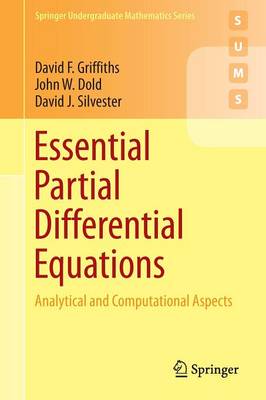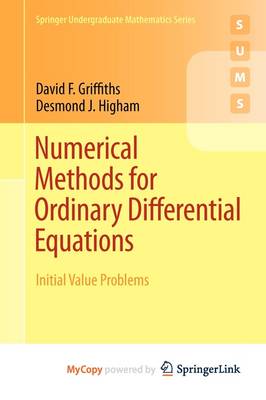Springer Undergraduate Mathematics
2 total works
Essential Partial Differential Equations
by David F. Griffiths, John W. Dold, and David J. Silvester
This volume provides an introduction to the analytical and numerical aspects of partial differential equations (PDEs). It unifies an analytical and computational approach for these; the qualitative behaviour of solutions being established using classical concepts: maximum principles and energy methods. Notable inclusions are the treatment of irregularly shaped boundaries, polar coordinates and the use of flux-limiters when approximating hyperbolic conservation laws. The numerical analysis of difference schemes is rigorously developed using discrete maximum principles and discrete Fourier analysis. A novel feature is the inclusion of a chapter containing projects, intended for either individual or group study, that cover a range of topics such as parabolic smoothing, travelling waves, isospectral matrices, and the approximation of multidimensional advection-diffusion problems.
The underlying theory is illustrated by numerous examples and there are around 300 exercises, designed to promote and test understanding. They are starred according to level of difficulty. Solutions to odd-numbered exercises are available to all readers while even-numbered solutions are available to authorised instructors.
Written in an informal yet rigorous style, Essential Partial Differential Equations is designed for mathematics undergraduates in their final or penultimate year of university study, but will be equally useful for students following other scientific and engineering disciplines in which PDEs are of practical importance. The only prerequisite is a familiarity with the basic concepts of calculus and linear algebra.
Numerical Methods for Ordinary Differential Equations
by David F. Griffiths and Desmond J. Higham
Numerical Methods for Ordinary Differential Equations is a self-contained introduction to a fundamental field of numerical analysis and scientific computation. Written for undergraduate students with a mathematical background, this book focuses on the analysis of numerical methods without losing sight of the practical nature of the subject.
It covers the topics traditionally treated in a first course, but also highlights new and emerging themes. Chapters are broken down into `lecture' sized pieces, motivated and illustrated by numerous theoretical and computational examples.
Over 200 exercises are provided and these are starred according to their degree of difficulty. Solutions to all exercises are available to authorized instructors.
The book covers key foundation topics:
o Taylor series methods
o Runge--Kutta methods
o Linear multistep methods
o Convergence
o Stability
and a range of modern themes:
o Adaptive stepsize selection
o Long term dynamics
o Modified equations
o Geometric integration
o Stochastic differential equations
The prerequisite of a basic university-level calculus class is assumed, although appropriate background results are also summarized in appendices. A dedicated website for the book containing extra information can be found via www.springer.com

